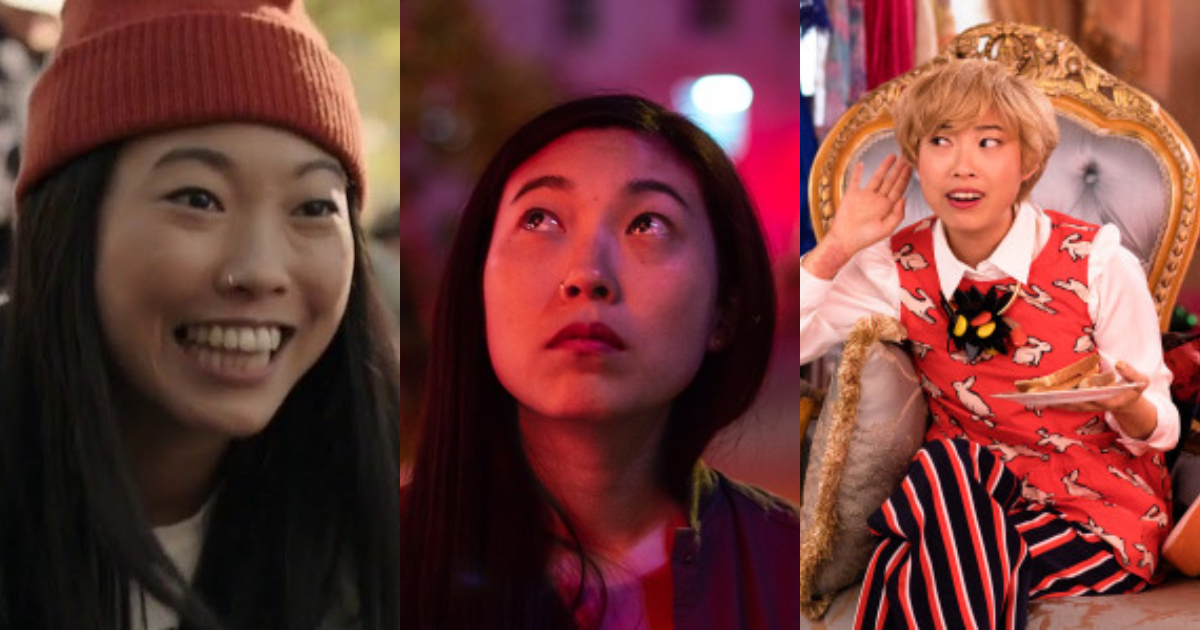Before Awkwafina made history as the very first woman of Asian descent to ever win a Golden Globe Award for Best Actress in a film, before she stole our hearts for her breakout role in blockbuster hit Crazy Rich Asians, before she became the viral rapper who sang about her female parts, before she even became “Awkwafina,” she was Nora Lum—timid 90s baby, New York native, Gemini.
View this post on Instagram
Born in 1988, Nora grew up in Queens, New York where her early years were marked by the death of her South Korean mother, who was diagnosed with pulmonary hypertension shortly after she gave birth.
“It was a very slow illness and she lived for four more years. I remember her, but I remember mostly when she passed,” she told The Guardian. Her grandmother then stepped in to help her Chinese-American father raise her.
It was during this time when Nora discovered her passion for making people laugh. “Obviously it was a very tragic situation, but I felt odd and uncomfortable when adults cried to me. One of the first emotions I ever felt was embarrassment. So I started trying to make them laugh,” she said.
And in the years that followed, comedy became second-nature and she brandished her label as the “class clown” with pride. At age 15, “Awkwafina” was born.
“I just thought it was a funny name,” she shared, explaining the reason behind her stage name. “And it was fitting that it had ‘awkward’ in it, because I am awkward.”
But her brief stint in performing arts in High School was cut short after she went to college to major in journalism and women’s studies before flying to China to learn Mandarin.
‘Nothing to lose’
In 2012, Awkwafina experienced her first accidental success on the day of her 24th birthday. She had uploaded a music video for her rap song “My Vag” which she had written at age 19 as a response to Mickey Avalon’s “My Dick” and which surprisingly became a viral hit.
The lyrics, as crude as you’d expect, begin with: “My vag like a operatic ballad / yo vag like Grandpa’s cabbage / and my vag effortless / yo vag post ads on Craig’s List.”
“I didn’t intend it to get more than 30 views from like my entire family,” she told NPR.
Though it immediately launched Awkwafina’s career in music and comedy, it didn’t come without consequences. She was fired from her job as a publicity assistant in a publishing company and it strained her relationship with her father.
“There was a chance that I could never get a 9-to-5 job ever again, because all it takes is one Google search and then that comes up,” she explained. “So I knew that there was no turning back. But I had nothing to lose, and that’s when the best things happen.”
She followed it up with a couple more equally as crude songs before she gave acting a go through the advice of friends. She went onscreen in MTV’s Girl Code and Neighbors 2: Sorority Rising, and then on Netflix film Dude which subsequently landed her a role in Ocean’s 8.
It was for her breakout performance in the critically-acclaimed movie Crazy Rich Asians that Awkwafina became a name to remember.
(ALSO READ: INSPIRING: Awkwafina Went from Earning $9/Hour to Starring in ‘Crazy Rich Asians’)
‘Shattering stereotypes in telling Asian stories’
Awkwafina gives a glimpse of Nora Lum in her role for her latest film, The Farewell (directed by Lulu Wang). In it, she plays a Chinese-American aspiring writer who flies to her homeland to help her family keep her grandmother from finding out that she has terminal lung cancer and only has a few months left to live.
“I took on The Farewell for multiple reasons, but mostly since it had such a personal connection to me because of my relationship with my grandma, who raised me. I’ve read a lot of scripts, but I’d never seen one like that. It’s a new way of telling Asian stories,” she told InStyle.
“Every time I walk into a room, I know everyone has an expectation of who I am, and I have to work hard to convince them otherwise. It’s really easy to lump Asian-American girls together without knowing that we’re a diverse group of people with different backgrounds and stories. My voice helps — it’s so unfitting for a 5-foot-1-inch, 120-pound woman — but I’ll continue to fight perceptions.”
Though she initially didn’t want to be labeled as an “Asian-American artist,” she grew to accept it.
“Nobody wants to be ‘the Asian.’ They want to be ‘the artist.’ And at first, I really didn’t want the burden of representing [the Asian-American community],” she shared with NPR in a separate interview. “The only thing I can do, at this point, is to represent them well … I’m definitely not all Asians but the thing that I’ve always done is aggressively been myself. And I think that by being yourself, you don’t dictate what an Asian-American is … You just add to what we are as a diverse people.”
And if her Golden Globe win tells us anything, it’s that the Asian community is finally getting the representation and respect it long deserved in the industry.
(ALSO READ: ‘Parasite’ makes Golden Globes history)
Awkwafina says hello to a Golden Globe for her role in “The Farewell”.
Hear her speech for Best Actress in a Musical or Comedy at The #GoldenGlobes. pic.twitter.com/BPpZT0Fr9J
— NBC Entertainment (@nbc) January 6, 2020
‘Being Nora’
Though, to say that she was Nora Lum as though she left that part of her life behind for the glitz and glamor of Hollywood would be highly inaccurate. Nora never left. In the moments of peace when the cameras stop rolling and the lights fade out, Awkwafina becomes who she has always been—a timid city girl just trying her best to navigate adulthood.
“There is a duality between Awkwafina and Nora,” she told The Guardian. “Awkwafina is someone who never grew up, who never had to bear the brunt of all the insecurities and overthinking that come with adulthood. Awkwafina is the girl I was in high school—who did not give a s***. Nora is neurotic and an overthinker and could never perform in front of an audience of hecklers.”
You’d think, with that duality, she’d rather be the confident persona she created in her early teens. But she confessed: “I’m Nora most of the time. But when I’m in a good mood I’m Awkwafina. When I’m in a bad, sad, lonely mood, it’s Nora all the way. When I come home at night from being Awkwafina, that’s Nora. I compare it to (Jim Carrey’s) The Mask… Thank God for the mask.”
She does wonder often about the life she would have led if she hadn’t lost her mom at such a young age.
Speaking to People, she revealed: “I think all the time, what would I have been doing if my mom hadn’t passed? I don’t think I’d be here, because I think that I had to face a certain level of trauma to be so joyously self-deprecating and so free.”
But things happen for a reason, and she wishes she hadn’t worried so much about everything growing older.
“Not because it will work out, but because that’s all I did, worry,” she explained. “Now I just want Awkwafina to represent the positive impact of what I went through.”
(ALSO READ: 10 reasons why 2018 was the most important year for Asians in media)
Do you have a story for the WhenInManila.com Team? Email us at story.wheninmanila@gmail.com or send us a direct message at WhenInManila.com Facebook Page. Interact with the team and join the WhenInManila.com Community at WIM Squad!





